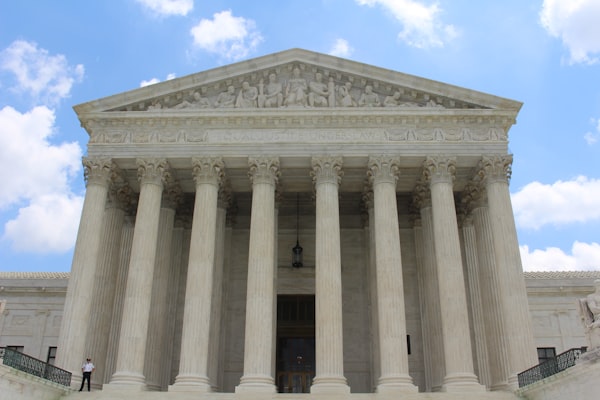Nothing Will Be The Same
The collapse of Roe v Wade is just the beginning.

For most of the 20th century, the Supreme Court has acted as a backstop for the excesses of American politics. While the court liked to style itself as above politics, it nevertheless is and always has been a political entity. The surprisingly liberal bent of Justice Stevens and Justice Kennedy kept the court generally (but not completely) on the side of an expanding series of rights. Justice Roberts also tended to keep the court on the side of precedent in the name of stability.
For most Americans, the Supreme Court served as a bastion of stability and (at least superficially) expanding rights.
This all changed with the appointment of three conservative justices under Trump. The delivery of these justices was the end game for evangelicals - it’s why they supported Trump in 2016 despite Trump’s colorful past.
With the first rulings from the new Trump-centric court due this summer, most observers expected Roe v Wade to fall, perhaps in an incremental fashion (as suggested by comments from Chief Justice Roberts). Instead, the leaked text from Politico shows the five conservative justices ready and willing to exercise powers without any restraint of precedent or settled decisions.
I highly recommend reading the full text, or at least a few key passages. The scale and scope is astonishing.
It’s impossible to predict the scale and scope of the rulings of this new court, but the following are all being widely-discussed as potential next steps.
- Eliminating marriage for any save a man & woman
- Eliminating racial protections
- Eliminating the EPA
- Eliminating voter protections
- Eliminating the ACA
The nation has never known a Supreme Court that will so willingly and trivially throw away precedent in favor of a dramatic reinterpretation of federal governance.
Now What?
First of all, the current justices are relatively young. The oldest, Clarence Thomas is only 74. It’s reasonable to expect the current configuration of the court could easily last a decade or more.
Assuming none of the justice die or retire, there is little to be done in the way of alternative remedies. Impeachment (even for lying under oath during the confirmation process) requires a 2/3 majority in the Senate, a virtual impossibility.
Any changes to the composition of the court (for example, adding additional justices) would, under filibuster rules, require sixty senators. The Democrats are unwilling to carve out a narrow filibuster for other priorities, such as voter protection and to protect Roe v Wade, so it appears unlikely that they would attempt to restructure the court.
One other option is for the states and/or the executive branch to simply… ignore the federal court. This is essentially the strategy applied to marijuana - the federal government currently still considers marijuana a Schedule 1 drug (i.e. the same as, say, PCP, heroin or crystal meth), but many states disregard this with legalized marijuana. In this option, as the courts move to strike down rights and federal responsibilities, the states would move to set up their own system[s].
To summarize, the main options are:
- Wait for the justices to die or retire.
- Hope that at some indeterminate point in the (potentially distant) future there are enough votes to change the court configuration.
- Hope(?) that the states actively ignore the rulings of the Supreme Court.
These are all terrible options.
It’s telling that the Democrats and other organizations have already moved to fundraising, but aren’t being particularly clear with their constituents about the challenges. It’s really, really bad, and it’s going to get so much worse.
Election of 2024
If all of that isn’t depressing enough, unfortunately there is one remaining glaring issue - the upcoming presidential election in 2024.
Most polling before the Roe v Wade leak pointed to the Democrats losing the House and/or Senate, which would lead to a virtual paralysis of Congress. It’s hard to imagine Biden being more successful at passing an agenda with a dead-locked Congress, which points to a very challenging, close 2024 Presidential election.1
With that backdrop, it’s pretty easy to imagine a scenario in which the election of 2024 is punted to the Supreme Court in a manner similar to Bush v Gore. If the election is close enough, or if there are enough reports of irregularities or violence, it’s possible that the Republican candidate might appeal to the Supreme Court and for the election to be decided along similar lines (perhaps even citing Bush v Gore as precedent).
It’s hard to imagine the response if the 2024 election is thrown to Trump or a similarly inclined Republican candidate by the Supreme Court, especially if it involves a similarly lopsided delta between the Electoral College and the popular vote. Even a lopsided Electoral College victory and popular vote loss (again!) could be highly destabilizing.
This is one of the scenarios that I was considering when I wrote A More Perfect Union. Amy Coney Barrett had already been confirmed, so the configuration of the SCOTUS was already known.
Watching the Polls
As covered in A More Perfect Union, the red states are by and large already polling in favor of breaking up the federal government into regional nations.
In later chapters I covered the importance of California and New York in the polling and popular acceptance of a reconfiguration of the federal government. The open question is one of priorities - do more Californians value the federal government as an institution? Or will the combination of the Supreme Court rulings and a potentially thrown election serve as breaking points?
If the polling grows to exceed 50% in California and an initiative is passed in favor of exploring a break, it’s possible that this idea could go from an obscure political idea to a matter of mainstream discussion pretty quickly. Unlike most potential amendments (e.g. voting reform, abolishing the Electoral College, reforming the Senate, etc.) it’s one of the few that would have broad support across the political divide.
Closing Thoughts
The latest Bright Line Watch report is full of interesting topics, including an analysis of political violence, support for significant change to American government, and much more. Highly recommended if you want to get into the weeds.
Also, the Washington Post article “We are closer to civil war than any of us would like to believe,’ came out back in December 2021, before the Roe v Wade decision. Sobering reading.
As always, if you have any questions or thoughts, let me know.
- Alex
It’s possible that Roe v Wade and other Supreme Court rulings might lead to a 2022 reversal, or the SCOTUS rulings might demoralize Democrats and encourage Republicans to reach further. It’s just too early to know. ↩



